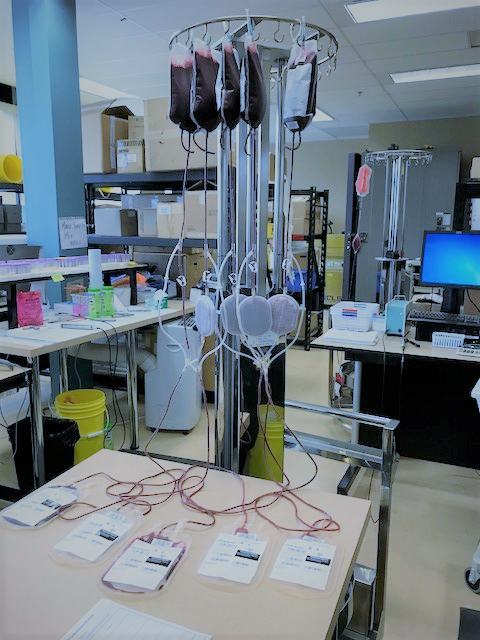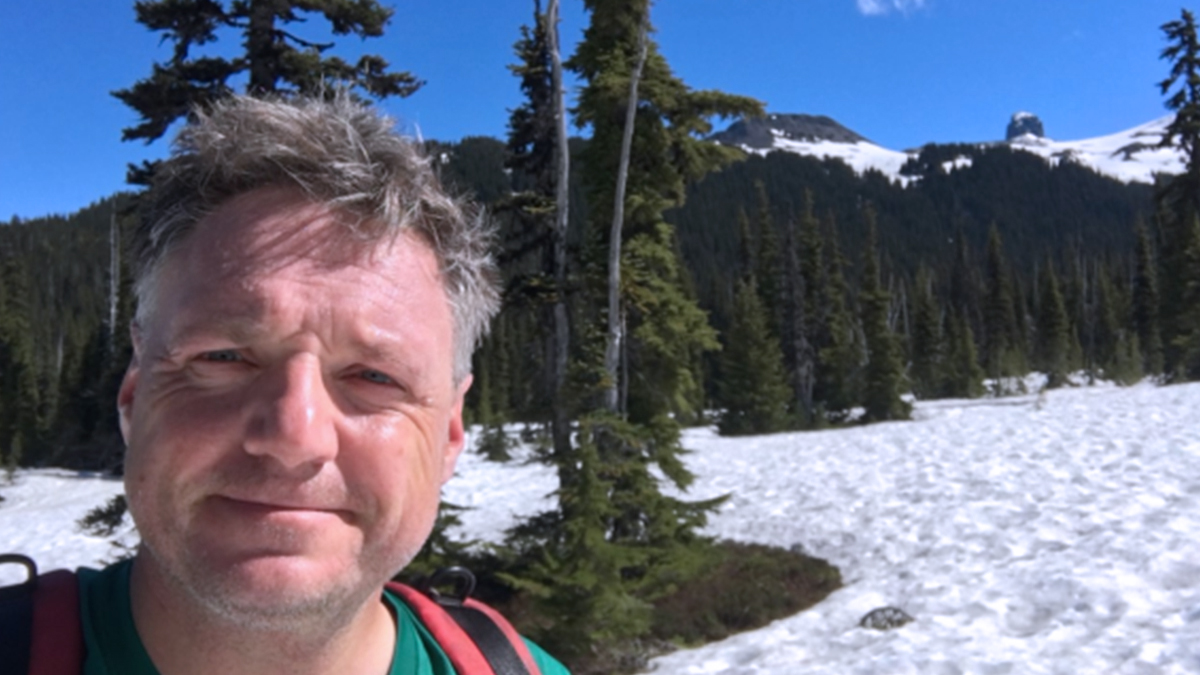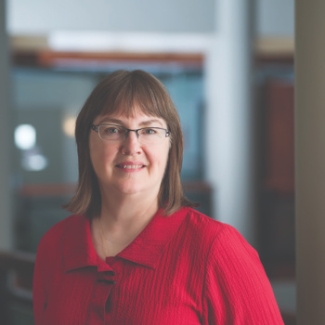Stories worth sharing - Meet the researcher: Dr. Peter Schubert
Thursday, April 15, 2021 Guest Author
This is an edited repost of a profile written by Andy An, MD/PhD student in the Hancock Lab and Cecilia H. Kim, CBR-SBME Summer Studentship Program alumna. The original article can be found on the Centre for Blood Research blog here.
Dr. Peter Schubert is a principal investigator with the UBC Centre for Blood Research (CBR) and a clinical associate professor at the department of pathology and laboratory medicine. As a Canadian Blood Services’ senior scientist and the principal manager of the Blood4Research Facility, which is part of the Centre for Innovation, he is also responsible for facilitating the provision of blood to researchers, in order to advance the fields of transfusion and transplantation medicine.

Dr. Schubert is involved in many transfusion medicine projects with Canadian Blood Services that focus on addressing current issues in blood banking. His research primarily revolves around improving current blood products, and also developing next generation blood products to optimize delivery to patients who need transfusions.
For this edition of “Meet the Researcher”, we had the pleasure of chatting with Dr. Schubert about his background, research, and advice for young scientists.
This interview has been edited for length and clarity.
Can you tell us a bit more about your research background?
I studied chemistry and biochemistry for my Bachelors and Masters in Germany, and then completed my PhD in biochemistry, molecular biology, and microbiology. I later conducted my postdoctoral research at the Biomedical Research Centre at UBC, gaining scientific training in cell biology and proteomics. Having a background in different scientific fields helps me better understand the rapidly developing interface between chemistry, cell biology, and biochemistry.
What inspired you to focus on transfusion medicine?
I think it’s not what inspired me but who inspired me to get into transfusion science. In the last year of my postdoctoral fellowship, Dr. Dana Devine, now Canadian Blood Services’ Chief Scientist and director of the Centre for Blood Research, approached me to collaborate on a project involving the application of proteomics to platelet storage. Donated blood is separated into its components – plasma, platelets, and red blood cells – and stored in plastic bags. Over time, storage causes the deterioration of these components.
Fifteen years ago, we didn’t understand what caused stored platelet deterioration, so we compared the proteome of fresh and stored platelets to answer that question. It was a great example of translational science that connected my technological expertise with Dana’s vast background in blood banking. Through this collaboration, Dana got me very excited about transfusion science and later offered me a job within her group at Canadian Blood Services, where I started my career in this field. Kudos to her!
What excites you most about your current research?
We’re currently working on really exciting and potentially impactful developments in blood banking, and subsequently transfusion medicine. For example, we’re trying to create products for trauma patients to increase their chances of survival after an accident. Many trauma fatalities happen even before first responders bring a patient to the ER for treatment. We’re looking into developing a leukoreduced whole blood product that first responders could use as a single transfusable unit for patients before they arrive at the ER. This is very exciting in terms of the impact it could have on patient survival.
Did you notice any differences between the research culture in Germany and Canada?
From a research perspective, there's not much difference. We all work towards the same goal of making discoveries and innovations, and we conduct clinical and translational research in both countries. However, the cost and expectations of graduate programs are quite different. When I went through graduate school, you didn’t pay tuition in Germany, which I think impacts student motivation. Sometimes students take longer to finish their degrees in Germany because there's not as much financial pressure.
Additionally, over the last few years, there have been some attempts in Germany to make the undergraduate and graduate program structures more similar to the North American system, to facilitate foreign exchange for students. I think this is a brilliant idea.
What advice would you have for emerging researchers?
To face the many challenges of research, you need to be highly motivated, extremely curious, and plan out your goals and milestones. I learned quite early on in my career that research alone doesn’t cut it anymore. Researchers also need to deal with politics and business. You need to collaborate with different people and join committees to get different viewpoints. This helps you build networks with your colleagues and those deciding grant outcomes. The CBR helps foster this type of collaboration with many career development events and platforms. So be on a constant lookout for new opportunities!
Could you tell us what a workday in your life looks like and how COVID-19 has affected your day-to-day responsibilities?
As the new principal manager for the Blood4Research facility, I’ve now largely transitioned into a management role, so I'm grateful to my team that handles most of my research. I start work at 6 am, as I deal with the head office of the Canadian Blood Services in Ottawa and have conference calls until noon to discuss different projects at Blood4Research. Later, I touch base with my research team and my day usually ends at around 3 PM when the East Coast closes.
I’ve been enjoying all aspects of my job, including the commitments I have with the CBR and the Pathology department. Despite COVID-19, I still commute to work every day to work with my large team. We have COVID-19 safety protocols in place and we continue to have donors coming in for risk-protected blood donations.
What do you hope to be a legacy of your research?
I’m not very big into accolades – it’s more that I love innovative research and thinking about ways to improve projects. While it would be nice to have research accomplishments, it is important to me that everyone I work with is happy and leads a balanced life while finding purpose in their work. That holds more significance than any award for me, as I believe one can only be successful if the whole team is successful.
When you're not working, what other activities do you enjoy?
I'm an outdoors person and I like to go hiking or snowshoeing, to get away from the noisy city (I’m now used to the Vancouver rain!). Just sitting on a mountain and enjoying the peace and quiet, where no cell phone, email, or text can reach you, is something really special. In my free time, I’m also happy to reconnect with former students who might need help, like references or support and advice.

Interested in the netCAD Blood4Research Facility?
- Read a CBR Summer Student’s account of touring the facility
- Learn more about the Blood4Research Program on blood.ca
Canadian Blood Services – Driving world-class innovation
Through discovery, development and applied research, Canadian Blood Services drives world-class innovation in blood transfusion, cellular therapy and transplantation—bringing clarity and insight to an increasingly complex healthcare future. Our dedicated research team and extended network of partners engage in exploratory and applied research to create new knowledge, inform and enhance best practices, contribute to the development of new services and technologies, and build capacity through training and collaboration. Find out more about our research impact.
The opinions reflected in this post are those of the author and do not necessarily reflect the opinions of Canadian Blood Services nor do they reflect the views of Health Canada or any other funding agency.
Related blog posts
The Canadian Blood Services Centre for Innovation has been doing research to develop a “new” product for transfusion that some might find surprising: whole blood! Yes, the fluid that is originally drawn from a donor. To learn why, we need to delve into the history of blood transfusion and innovation over the past century.
Dr. Devine will bring roles together to bridge discoveries into better care
Located in Vancouver, BC, near the University of British Columbia campus, our blood for research facility comprises a whole blood and apheresis donor clinic as well as a research and production laboratory.


